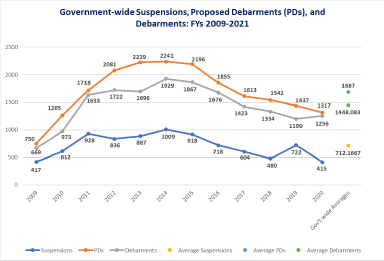The Interagency Suspension and Debarment Committee (ISDC) recently issued its annual report to Congress on federal government suspension and debarment activities for fiscal year (FY) 2020. Key takeaways from the year’s ISDC report are discussed below.
What is the ISDC Suspension and Debarment Report?
Created by Executive Order 12549, the ISDC is an interagency body “consisting of Federal agencies that pool resources, experience, and promising practices to provide support for suspension and debarment programs throughout the Federal Government.” Section 873 of Public Law 110-417 requires the ISDC to submit an annual report to Congress on, among other things, “the progress and efforts to improve the suspension and debarment system” and “a summary of each agency’s activities and accomplishments in the Government debarment system.”
What are the key takeaways from this year’s report?
As the following chart from the ISDC report shows, agencies reported issuing 415 suspensions, 1,317 proposed debarments, and 1,256 debarments government-wide in FY 2020, “notwithstanding the COVID-19 pandemic and dispersed, remote, or socially distanced workforce.”

By comparison, federal agencies initiated a total of 3,358 suspension and debarment-related actions in FY 2019 (722 suspensions, 1,437 proposed debarments, and 1,199 debarments).
In FY 2020, federal agencies also reported a total receipt of 2,446 referrals and the issuance of 183 declinations government-wide. Agencies also reported an approximately 20% increase in total post-notice engagements with respondents from FY 2019.
Finally, the report notes that for FY 2020 federal agencies reported entering into 58 administrative agreements, which are used as an alternative to suspension and debarment and typically mandate the implementation of measures to improve the ethical culture and corporate governance of a respondence. By comparison, for FY 2019 federal agencies reported entering into 54 administrative agreements.





 />i
/>i
